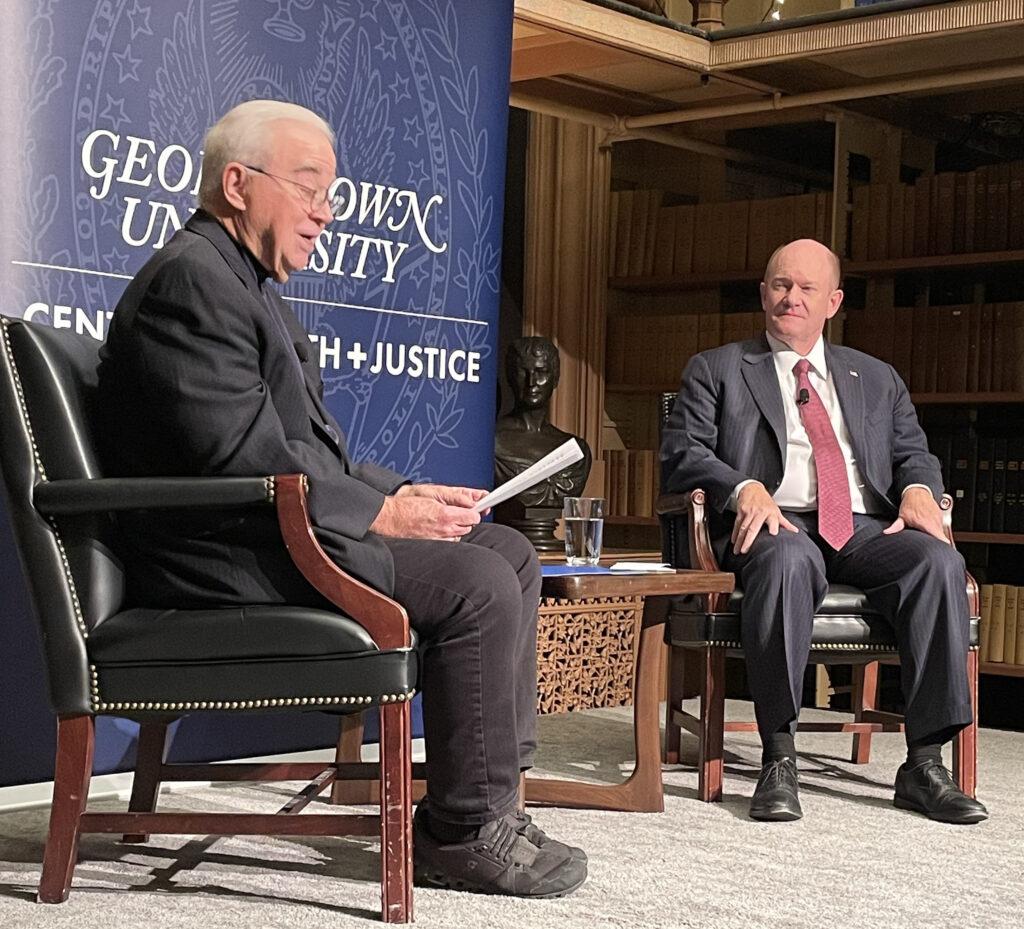Sen. Chris Coons (D-Del.) talked about his tenure in Congress and the role of faith in his personal life at a Nov. 28 Georgetown University event.
Jim Wallis, the director of the Georgetown Center on Faith and Justice, moderated the conversation that touched on Coons’ experience in mission work, his activity in the church and his work in the Senate. Coons, who is Presbyterian, said his faith shaped his decision to enter public service and has helped him work toward reconciliation with Republican politicians amid tense polarization in Congress following the Jan. 6 insurrection.
Coons said it is important to balance faith with inclusivity as a senator representing millions of people.
“I try to simultaneously, particularly when I’m home in Delaware, make it clear to folks that I think you need to know where I’m coming from and what informs my core values,” Coons said. “But it is my job, as a senator, to be available to and advocate for and embrace people who come at public life from a wide range of faith views because that’s what religious freedom means in our country.”
Coons said he decided to switch from the Republican to the Democratic party in 1988 after struggling to defend domestic and international inequalities like wealth disparity and apartheid in South Africa while speaking with friends and students, leading him to question his values and political beliefs.
“Trying to defend what was then the Reagan administration’s policy towards South Africa in debates with students at the University of Nairobi was really hard,” Coons said. “I couldn’t explain or defend America’s position, and that began a much longer journey.”
The Reagan administration largely backed the South African government and its apartheid policies that discriminated against Black South Africans because it wanted to prevent the spread of communism and radicalism. Reagan supported “constructive engagement,” working with moderates toward gradual change, and also tried to veto a law that levied economic sanctions, though he was overridden by Congress.

Wallis then steered the discussion toward the impact of faith on polarization and the partisan divide between Democratic and Republican senators. Coons said faith and coming together at prayer breakfasts, where senators of many faith traditions come together to pray and talk about their personal lives with no one else in the room, can help find this middle ground and develop relationships with senators across the aisle.
“There are some senators with whom I genuinely struggle to find any grounds for reconciliation,” Coons said. “But if you’re willing to come and sit down and participate in prayer and hymns and stuff, the ones that were there eventually have become some of my best friends in the Senate.”
During a question and answer period where he fielded questions from students, Coons said cellphones were a barrier to conversation and that in-person conversations are necessary to build relationships.
“Turn them off, put the tools down,” Coons said. “I think these are profoundly divisive. Speaking for myself, I spend too much time doom scrolling, looking at stuff that is just not healthy and not constructive and presents two-dimensional caricatures of other public figures.”
“I think spending time with people is a challenge and an opportunity and ultimately a blessing. And if you aren’t spending time with people from significantly different views and backgrounds and just listening more than you’re talking, you may not be fully open to others’ perspectives,” Coons added.
Wallis ended the conversation by asking Coons about what he would tell young Americans, specifically those who believe American democracy is in trouble or has failed. Coons said students and young people need to get involved in public life, whether in an elected office or civic organization, to help bridge the political divide.
“I think American democracy is in trouble,” Coons said. “We are really having trouble as a country respecting each other, hearing each other. Our conduct at home and abroad raises a lot of moral challenges and finding a path forward has become fraught and difficult.”
“It is my hope that some people listening will decide that being engaged in the work of democracy is worth your time,” Coons added.




















